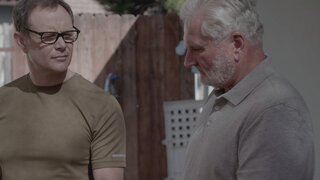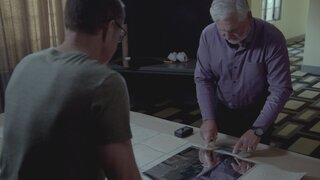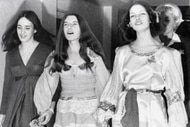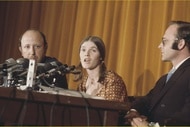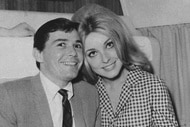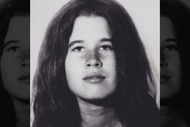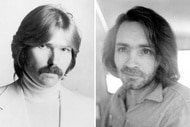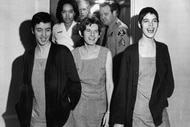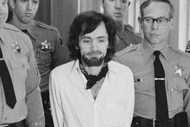Miracle Mile Murders: How A Glove Fragment Helped Solve Grisly Triple Murder
The investigation into a Koreatown triple murder went cold until DNA evidence was linked to an unlikely suspect.
There is, unfortunately, no shortage of crimes in Hollywood. People have heard all about the unsolved murder of the Black Dahlia and the hunt for the Hillside Strangler, not to forget the terror that spread through the city as the Night Stalker Richard Ramirez preyed on innocent women.
But few people know about the savage Miracle Mile Murders, which left three people dead in the working-class neighborhood of Koreatown on May 5, 2003. It was a brutal crime that received plenty of attention in Korean-language newspapers, but barely made a splash in the local news outlets at the time.
RELATED: Why Are People Comparing University of Idaho Murder Suspect Bryan Kohberger to Ted Bundy?
Then, the case was suddenly solved in 2009 — though the arrest of Robin Kyu Cho led to more questions than answers. Here's what we know...
Who Were The Victims Of The Miracle Mile Murders?
On the afternoon of May 5, 2003, Charis Song’s mother Cosmos Chang traveled to the Song family's Koreatown apartment to visit with 2-year-old grandson Nathan, who was being cared for by nanny Eun Suk Min, 56. Cosmos believed that Charis, whose birth name is Chi Hyon, was at the family’s clothing factory, where she and husband Byung worked during the day.
However, when she entered the apartment, Chang noticed that the lights were on in the master bedroom, at which point she entered and found the bodies of Charis, Nathan and Min, according to a court documents. She screamed at the sight of the remains, her cries reaching neighbors who called 911, the Los Angeles Times reported.
When investigators arrived on the scene, they noticed that the three individuals had been shot at close range, the court documents noted. Min and Nathan had been left in the bathtub, while Charis was left slumped against the wall. She was the only victim to be bound and gagged with tape, which had fragments of latex gloves stuck on the interior.
"While the suspect was taping her face with plastic gloves, he stuck his hand to her face, pulled his hand to get his hand out and the fingertip stuck," Det. Brian McCartin, the lead investigator on the case for the Los Angeles Police Department, told CBS News in 2015.
This material was sent for DNA testing, resulting in the discovery of two DNA profiles, one of which belonged to Charis; the other was unknown.
McCartin told CBS News that it was a “brutal crime scene.”
Who Were The Suspects In The Miracle Mile Murders?
As investigators searched the apartment for clues, they noted that most of the Song family’s valuables were left behind, including jewelry and three certificates of deposit, according to LAPD Det. Robert Bub. Moreover, Charis was still wearing a wedding ring and Gucci watch when she was found dead, according to the Los Angeles Times.
With burglary eliminated as a motive, McCartin focused his attention on Byung, who initially described his marriage as good, but later admitted to having multiple affairs, the court documents stated. An anonymous tipster also sent a typewritten, photocopied letter to the police on May 16, 2003.
“Song’s husband have a young girlfriend [sic]. That’s why they had argument so much. He sent her to New York last month and will be back in July,” the supposed letter read, according to the court documents. “Husband hired guys from Korea to be free from wife and guys went to Korea last week. I do not know how much he paid for this service to guys from Korea.”
The letter included the names of two individuals supposedly tied to the case, though investigators couldn’t find them.
Ultimately, however, Byung was eliminated as a suspect during the investigation, and no further suspects were immediately identified in the case.
Byung has repeatedly insisted that he had nothing to do with the murders, stating that he lost two of the most important people in his life.
"If people understood, even a little, what it’s like to have lost a wife and child at once, they couldn’t cast me as a suspect like this,” he told the Korea Daily, according to the L.A. Times. “There are countless rumors, that my deceased wife was my second, that my business is not doing well.
Who is Robin Cho and How Was He Connected To The Case?
The case went cold until 2008, when the LAPD was notified that there was a match to the DNA found on the fragment of latex gloves. The DNA was a possible match to the Song’s former neighbor Robin Cho, who had pleaded guilty to a non-violent felony in connection to a $2-million Ponzi scheme in 2008. Since he was on probation, Cho was required to submit DNA, leading to the break in the case.
Investigators again spoke to Byung in 2008 and questioned him about his knowledge of Cho. “After our interview, he went back to work. He did not contact anybody, did not call anybody, so at that point, our belief was that absolutely, he had nothing to do with the case, nothing to do with the murder of his family," McCartin told CBS News.
Deputy District Attorney Frank Santoro said detectives began tailing Cho, who they observed dropping strange things at several locations across Los Angeles. Santoro continued, “And the cops go and recover one of the packages and in it are five live .38-caliber rounds.”
These were the same type of bullets that were used to murder Charis, Nathan and Min.
What Was Robin Cho’s Alibi?
Initially, Cho couldn’t remember his exact whereabouts on the day of the murders but stated that on Mondays in 2003 he usually drove his son to and from school, in addition to working, according to the court documents. During a second interrogation, he stated that he remembered visiting his brother’s dental office in Granada Hills, then added that he may have gone to a fast-food restaurant and a TJ Maxx store.
When investigators questioned how he remembered these details suddenly, Cho said that he had written it in a diary entry, though McCartin observed that neither the fast-food restaurant nor the TJ Maxx were mentioned in the journal, the court documents noted.
How Did Cho's DNA Get on the Latex Gloves?
When questioned about potentially using gloves, Cho told investigators he used gloves when cleaning his car because “oil and stuff" irritated his skin, according to the court documents. These gloves were stored by a golf cart that was left in the apartment parking garage.
Scott Paik, an investigator for the district attorney's office, asked if the gloves were like the red plastic gloves commonly used to wash dishes, the L.A. Times reported.
"No, not like that. You know, you go to doctor’s office, you see the glove, doctor wear the disposable glove, right?” Cho replied, confirming they were latex gloves.
Deputy D.A. Santoro said information on the latex glove wasn't shared with the public before, making Cho's statements all the more suspicious, according to the L.A. Times.
Song was eventually arrested and charged with capital murder. He went on trial in 2014.
What Was Robin Cho's Motive For Murder?
To this day, Cho maintains his innocence. During trial, his attorney Andrew Flier told jurors, "There is absolutely no motive for Mr. Cho."
But technically, the prosecution is not required to provide a motive, as Santoro reminded jurors in his closing arguments, according to CBS News. "Who cares why Mr. Cho committed this murder?" he asked the jury, adding, "he pulled the trigger six times."
In the end, jurors voted to convict Cho of the murders, sentencing him to life in prison without the possibility of parole in June 2012.
"He was actually one of the most sophisticated criminal defendants I've ever seen," Santoro said to CBS News. "He convinced businesspeople and family and friends that he was a legitimate businessman while he was nothing but a thief."
Cho is currently incarcerated at the Pelican Bay State Prison.


